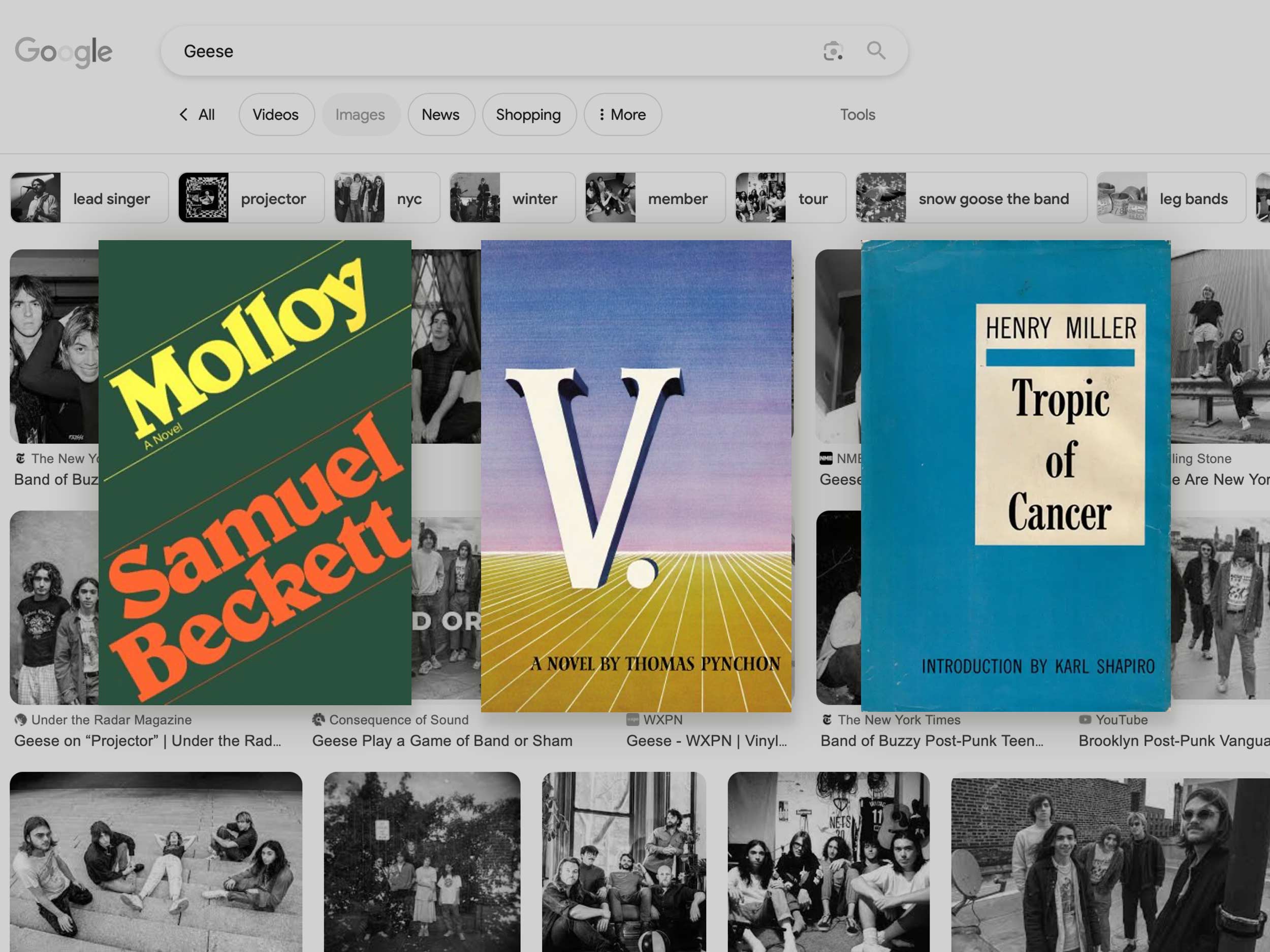The Brooklyn-based band offers Document a selection of books that embody the same ethos as their upcoming sophomore record, ‘3D Country’
Mania might be the most-cited muse of Brooklyn-based five-piece Geese. It’s a natural state of teenhood—a period the band is only just out of, having formed and released their first record at the end of their high school experience. But the sort of mania Geese is drawn to is more complex than mere chaos; its nightmares are near whimsical, and its influences exist in carefully-curated excess.
Their sophomore record, 3D Country, sets that mania onto the context of the West. Says frontman Cameron Winter, “The lyrics are this story I had about a cowboy who does psychedelics in the Wild West and fries his brain forever. I was imagining, at first, he’s this stoic, masculine character—like out of a Cormac McCarthy novel. But then he unravels and sees his past lives in Ancient Rome, the Great Wall of China.” The music itself applies classic country licks onto Geese’s psychedelic sound. Improvisational in spirit, the band unflinchingly employs a medley of source material, piecing together a story from their mass of material.
Ahead of the June 23 release of 3D Country, guitarist Foster Hudson shares with Document a booklist that centers the nightmarish themes of the record—texts that, like Geese’s music, aren’t despondent or sorrowful, but more akin to a “lost-in-the-funhouse” type of terror.
V. by Thomas Pynchon
“Anything I could say about V. comes hopelessly short of the magic of this book. I was lost within the first few chapters, to be sure, and I spent a lot of my time reading alongside a plot summary [of it that] I found online—which, naturally, also couldn’t contain all the disparate and esoteric references that play into any scene. I already feel like I’m over-describing it… To me, V. is about drinking wine in the street, chasing after alligators in the sewer, conspiracies, and the feeling when you look up from your shoes and don’t recognize a single building for miles.”
Tropic of Cancer by Henry Miller
“I began reading Tropic of Cancer while we were on tour, playing festivals in Europe—at least, until I left my copy on a plane flying to Switzerland. I had to wait until I came back to New York to finish it, but even the hundred or so pages I was able to read on the road made a huge impression on me. Vibrant, scuzzy, kaleidoscopic: When Miller is in control of his prose, he operates on a frontier all his own.”
Molloy by Samuel Beckett
“Having tried and failed to enjoy Beckett’s penchant for the unconventional in the past, I was ready to be frustrated by Molloy. What I didn’t expect was how outrageously funny this book is. Molloy seems to have no interest in the kind of existential nightmare he’s caught within—instead, he wishes to develop a complex system for sucking on rocks, or test a newspaper’s ability to withstand his farts.”
Selected Poems by Mark Strand
“Our singer, Cameron, asked me to lend him some poetry a couple of weeks ago, and after struggling with indecision for a while, I landed on Mark Strand. At first glance, his poetry seems quiet, almost peaceful. Having reread it some months ago, I was struck by how anxious and terrified his voice is. Plus, ‘Keeping Things Whole’ is one of the best poems I have ever read, and the fact that he wrote it on a cocktail napkin in five minutes during a poker game will always make me mad with jealousy.”
Antony and Cleopatra by William Shakespeare
“At the risk of saying, ‘Geese is as good as Shakespeare,’ I decided to go with one of my favorite tragedies that doesn’t see as much recognition as, say, Hamlet or Macbeth. Antony and Cleopatra begins as a shrewd (and at times, dry) political drama, as Octavius Caesar seeks to quell a rebellion stirred by Pompey. Like many of Shakespeare’s best plays, it swiftly and dramatically shifts into a story of betrayal, manipulation, and lust as Antony and Octavius find themselves at each other’s throats. At the end of the day, any of Shakespeare’s plays could have found their way here—there is simply nothing better.”
The Tennis Court Oath by John Ashbery
“This is most likely the biggest stretch in terms of the ‘theme’ of this booklist—but I can’t help myself. John Ashbery remains my favorite poet—each time I return to one of his collections, I enjoy it even more than the last. The Tennis Court Oath is an electric book of poetry. The opening lines of the title poem have remained in my head, long after I first read them: ‘What had you been thinking about / the face studiously bloodied / heaven blotted region…’”



















